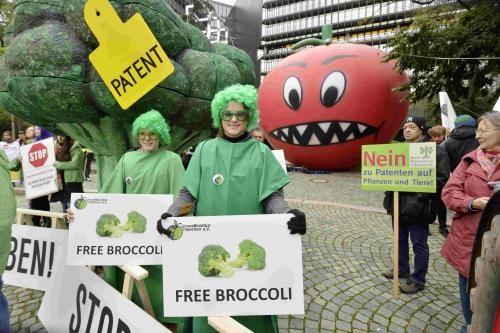Act now – save the future of our food! The signatories call for an immediate amendment of the Implementing Regulation to the European Patent Convention and for a change in European Patent law to finally exclude all breeding processes and breeding material, plant and animal characteristics, gene sequences, plants and animals, as well as food derived thereof from patentability.
First signatories
- Berne Declaration
- Greenpeace
- Kein Patent auf Leben
- Misereor
- Le Réseau Semences Paysannes
- Swissaid
- Utviklingsfondet
- GeneWatch
- Rete Semi Rurali
- Bionext
- Red de Semillas “Resembrando e Intercambiando”
- ProSpecieRara
please sign here as individual
please sign here as organisation
27547 signatures of individuals.
On 25 March 2015, the Enlarged Board of Appeal of the European Patent Office (EPO) confirmed the view that current interpretation of patent law is unacceptable. Whilst processes for conventional breeding cannot be patented, plants and animals stemming from these processes can be patented. This is not only contradictory in itself, but also undermines the prohibitions in European patent law: “Plant and animal varieties or essentially biological processes for production plants and animals” are excluded from patentability (Art 53 b, EPC). The decision made by the Enlarged Board of Appeal will be binding for all other EPO decisions in this context, and therefore the rules for the interpretation of the European Patent Convention need to be changed in order to strengthen and uphold current prohibitions already set out in European Patent Law. The Administrative Council of the European Patent Organisation has the power to do this by changing the Implementing Regulation. Please help us to put more pressure on the Administrative Council to ensure that this happens!
There are already several examples that show how plants and animals are turned into so-called industrial inventions. Even trivial technical steps such as analysing natural genetic conditions, measuring compounds (such as oil or protein), crossing-in native traits which already exist in landraces or wild relatives, or just simply describing general characteristics can ultimately lead to plants and animals being seen as so-called inventions and then monopolised in patents. Many patents and patent applications are based on biopiracy, by misappropriation of genetic ressources originating from the centres of biodiversity of our crop plants. In many cases, these patents cover the whole of the value chain from breeding to harvesting and food and feed production. Patents cover all kinds of food crops: Vegetables such as tomatoes, broccoli, pepper, lettuce as well as soybeans, maize and wheat. They also cover edible parts of the plants such as the fruits or food processed thereof such as beer and bread. Such patents are quite simply an abuse of patent law, and should not be applicable to discoveries or natural resources but only to real inventions. This abuse is allowing a small number of companies and corporations to take control of basic resources needed for our daily food production.
Some corporations make massive profits from these patents. Companies such as Monsanto, Dupont, Syngenta, which are still filing a great number of patents on seeds. Furthermore, institutions and individuals, who base their business on legal activities around patents such as patent lawyers, consulting companies and, last but not least, the European Patent Office, all profit significantly. The EPO actually finances itself by granting patents and has now more or less taken on the role of delivering services to industry. All of the above are the stakeholders pushing for a particular kind of patent law, one which does not serve the interests of society, but puts just a few self-serving interest groups first.
Breeders, farmers, growers, food producers and consumers are the ones who will lose out and feel the impact most severely from the negative consequences of this development. Patents on plants and animals will foster further market concentration and make farmers and other parties in the food supply chain more and more dependent on just a few big multinational companies. Increasing concentration and monopolisation of the breeding sector will disable competition, hamper innovation and give a few international corporations the power to decide what is grown in the fields and the price we have to pay for it.
The European Patent Organisation consists of two bodies, the European Patent Office and the Administrative Council, which supervises the Office's activities. European politicians have to act now! As a first step, Member States of the European Patent Organisation should take the initiative to implement change at the Administrative Council. This council not only represents the Member States of the EPOorg, but also has the power to change the current rules governing patent law by amending the Implementing Regulation in the European Patent Convention.
National laws such as those in Germany and the Netherlands show that patents on plants and animals derived from conventional breeding can be prohibited on national level. Other countries should follow this example, and also prohibit patents on breeding material, gene sequences and native traits. Finally the European Patent law has to be changed to exclude all breeding processes and breeding material, plant and animal characteristics (including native traits), gene sequences, plants and animals, as well as food derived thereof from patentability. To achieve this goal, the European Governments and the EU Commission will need to cooperate very closely.
Source: no-patents-on-seeds.org
License: Public domain

